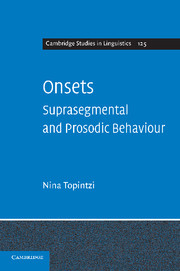Book contents
- Frontmatter
- Contents
- Preface
- Acknowledgements
- 1 Onsets and weight: the theory
- 2 Onsets and stress
- 3 Onsets and compensatory lengthening
- 4 Onsets and word minimality
- 5 Onsets and geminates
- 6 Other real and not so real onset-sensitive data: brief case-studies
- 7 Conclusion and discussion of alternatives
- References
- Subject index
- Language index
Preface
Published online by Cambridge University Press: 06 July 2010
- Frontmatter
- Contents
- Preface
- Acknowledgements
- 1 Onsets and weight: the theory
- 2 Onsets and stress
- 3 Onsets and compensatory lengthening
- 4 Onsets and word minimality
- 5 Onsets and geminates
- 6 Other real and not so real onset-sensitive data: brief case-studies
- 7 Conclusion and discussion of alternatives
- References
- Subject index
- Language index
Summary
Theme
As the title communicates, this book is about onsets. In particular, it focuses on their suprasegmental and prosodic behaviour. This on its own is quite interesting, given that most current phonological theory assigns no such role to onsets. The core of the discussion is devoted to proving this assertion wrong.
The pivotal proposal this book wishes to make is that onset weight exists. And like rimal weight, it participates in the same phenomena, that is, stress, compensatory lengthening, word minimality and gemination, among others. However, onset weight is not unrestricted. It may either be produced on the surface as a response to a weight-inducing requirement or it may be lexical, in which case its source is found in the underlying representation. The former type of onset weight is termed coerced, whereas the latter is dubbed distinctive, following Morén's (2001) similar distinction for coda weight. The first type of weight – but not the latter – is subject to certain limitations and thus can be assigned to a subset of segments only.
These restrictions represent a leading idea in the book. In particular, it is claimed that the optimal weightful onsets are those that lack the feature [+voice]. As a result, the prototypical moraic onsets are [−voice] ones, i.e. the voiceless obstruents. Justification for this account comes from the relationship between voicing, tone and stress. Examination of the tonogenesis facts reveals that the pitch perturbation due to (the lack of) voicing is commonly phonologized as tone.
- Type
- Chapter
- Information
- OnsetsSuprasegmental and Prosodic Behaviour, pp. ix - xiPublisher: Cambridge University PressPrint publication year: 2010



